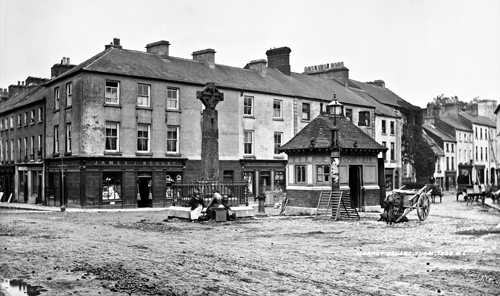Two more executions in Galway as cost of Civil War is felt in the west
Galway, 30 May 1923 - Two Galway men were executed at 8am this morning in Tuam for their involvement in the armed robbery of the Munster and Leinster Bank at Athenry.
Michael Murphy and Joseph O’Rourke, both from Ardrahan, protested that there was no political dimension to the robbery and that their actions were rooted in a dispute over land.
The bank robbery occurred on May 22nd and the two men appeared before a military tribunal charged with armed robbery, with being in possession without proper authority of Webley revolvers and with stealing a large sum of money from the Munster and Leinster Bank.
Nearly £700 was stolen and the raiders - three men - had hoped to flee by car when the raising of an alarm forced them to opt for another escape route. Two of the men were subsequently captured on the banks of a river some miles from the town, the Military Tribunal, held on May 24th - the same day as Mr. Frank Aiken issued his dump arms order- subsequently condemning them to a sentence of death.
Their last night was spent in the company of the army chaplain and they received Mass and communion before being blindfolded and taken to their execution.
In the neighbouring counties of Mayo and Sligo, meanwhile, claims in respect of £350,000 and £400,000 have been lodged with their individual county councils in response to the destruction of property, public and private, since July 1921, when the truce in the Anglo-Irish war was concluded.

The Main Street in Castlebar in Co. Mayo, late 19th century (Image: National Library of Ireland)
Given their comparative experiences over the last year, it is believed that a very large number of claims have yet to be lodged with Mayo Co. Council. Few towns suffered as badly as Charlestown where, of all the public buildings that once adorned the town, only the church and schools remain intact. The town hall and Hibernian Bank, two impressive modern buildings, were among those burned to the ground.
In Castlebar, the burning of the barracks will not only exact a cost on the public purse; it will also deprive the local council of impressive buildings that might have served as an asset in the years ahead, particularly in a town where there is already an acute shortage of housing
Nevertheless, the towns of Mayo and Sligo have fared relatively well, but this has been attributed to the need to house large garrisons which will not be sustained in an era of peace when many soldiers return to civilian employment.
Outside of the towns, meanwhile, there is acute poverty in the congested areas of Mayo, where life, always difficult, has become even harsher owing to the poor wages now available to Irish migratory workers across the Irish sea. In Achill, for instance, up to 1,600 men and women typically take off for Scotland to pick potatoes but owing to increased unemployment in rural England and the depressed wages available to migratory workers, this vital source of income has been greatly reduced.
[Editor's note: This is an article from Century Ireland, a fortnightly online newspaper, written from the perspective of a journalist 100 years ago, based on news reports of the time.]





















